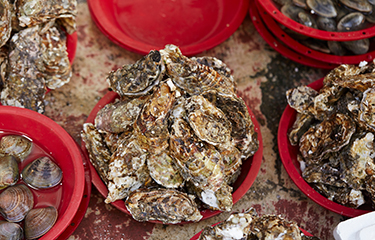The U.S. Trade Representative (USTR) announced on 4 February that the U.S. and European Union will resume bilateral trade of live, raw, and processed bivalve molluscan shellfish.
The negotiated agreement marks the first time bilateral trade of mollusks between the E.U. and U.S. will be allowed since 2011. The new agreement will allow producers in the U.S. states of Massachusetts and Washington to send mollusks to the E.U., and will allow producers in Spain and the Netherlands to send products to the U.S.
“Today’s announcement represents a positive step in the trade relationship between the United States and E.U.,” USTR Ambassador Katherine Tai said. “The Biden-Harris administration is committed to both addressing trade barriers and building new opportunities for U.S. producers, and we will continue to work to strengthen the U.S.-E.U. trade relationship.”
The trade in mollusks between the two countries was halted due to a difference in regulations. The U.S. Food and Drug Administration (FDA) proposed a resumption of live shellfish trading between the U.S. and E.U. when it published a determination in March 2018 providing an assurance safety protocols in the E.U. are equivalent to those in the U.S. The FDA finalized that determination in September 2020, which opened the door to imports from Spain and the Netherlands.
Producers eligible to export to the E.U. must be in good regulatory standing with the state’s shellfish authority, must appear on the Interstate Certified Shellfish Shippers List, and must be in good regulatory standing with the FDA.
“This announcement demonstrates an exciting opportunity for U.S. seafood producers to deliver world-leading products to consumers in the E.U. and furthers the U.S. Department of Agriculture’s mission to provide U.S. stakeholders opportunities to better compete in the global marketplace,” U.S. Secretary of Agriculture Thomas Vilsack said.
The change opens up new markets for U.S. producers in Washington and Massachusetts, which both have significant shellfish aquaculture operations. Washington is the largest producer of shellfish in the country and accounts for 25 percent of the country’s production by weight, with a farmgate value in excess of USD 100 million (EUR 87.3 million), according to the Pacific Shellfish Institute.
One of the largest shellfish producers in the country, Taylor Shellfish, is located in Washington, and Taylor Shellfish Director of Public Affairs Bill Dewey told SeafoodSource the company previously had a “robust” market in Europe that was growing before it was shut off.
“We were really disappointed to lose that,” Dewey said of the initial closure. He added that the trade has been closed for even longer than the USTR release, and that he “remembers well” when the border closed in 2010.
Dewey said the company has been pushing for the resumption of trade since it closed.
“We’ve had a number of occasions where we thought we were almost there, it was a few months away, and two years later we’d get the promise again,” he said. “We’re certainly grateful to see it finally done.”
With the developments, Dewey said old customers are already reaching out to begin doing business again.
“Since that word has been out, we’ve had a lot of contact from our customers that are anxious to get our products again,” he said. “We’ve had such a hard two years with the pandemic, and there has not been a lot of good news throughout the mix here, so this is certainly welcome.”
The National Fisheries Institute called the resumption of trade a “welcome development.”
“This agreement creates new markets for many U.S. exporters of Massachusetts and Washington states’ molluscan shellfish,” NFI President John Connelly said. “Trade in products like oysters, clams, mussels, and whole or roe-on scallops has been disrupted for nearly a decade. Now these highly sought-after U.S. products will have new markets, free of nonscientific trade barriers.”
Connelly added that the NFI is urging the USTR to follow through with other barriers to trade for species such as clams and other processed molluscan shellfish products.
“The economic opportunity presented by today’s agreement should be fully realized for American seafood workers throughout the entire U.S. supply chain,” Connelly said.
Photo courtesy of mnimage/Shutterstock







